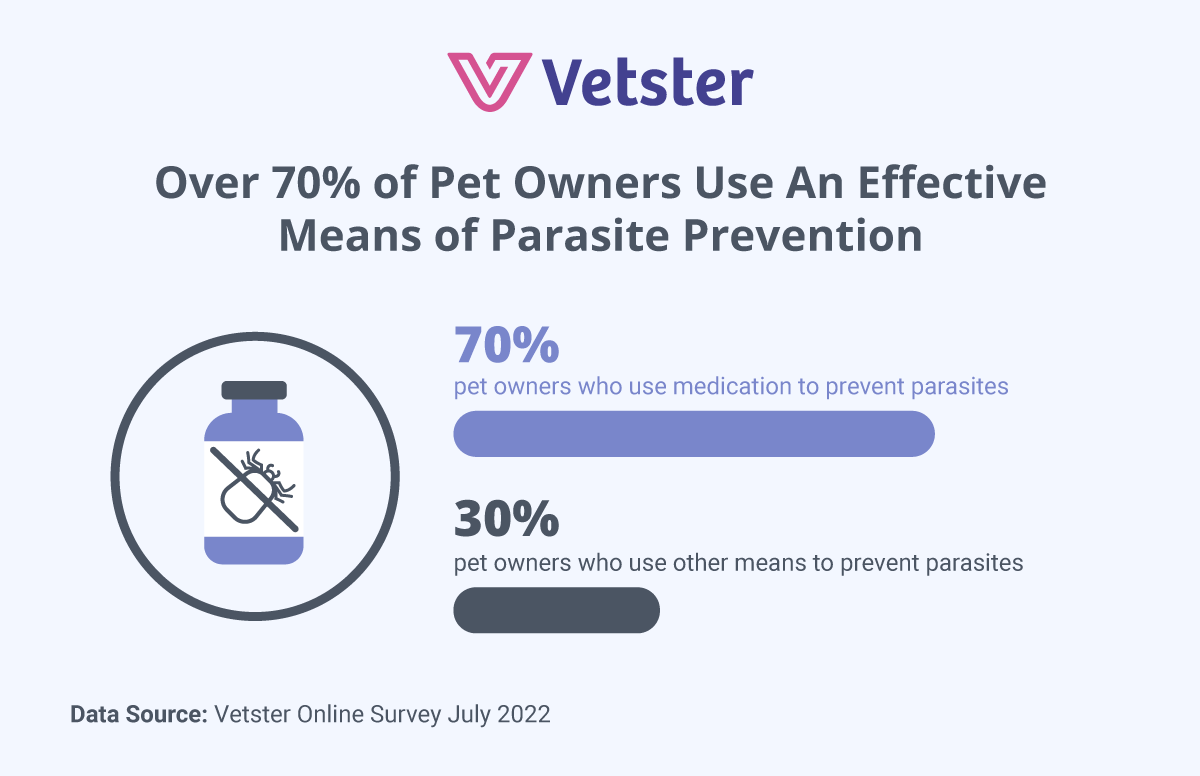Prevent parasites and improve your pet’s health

Fleas, mites, ticks, lice, and worms are all parasites that can lead to a number of illnesses in your pet if not treated properly. Many of these parasites can be prevented by using safe and effective parasite control products and medications. However, while about 95% of pet owners we surveyed said that they worry about parasites and their pets, only 70% of those surveyed use effective preventives. The remaining 30% either use no preventative measures at all or use ineffective and potentially dangerous remedies.

Parasites: Hiding in Plain Sight
Most of the time parasites don’t cause any symptoms whatsoever and are easy to miss. Parasites have evolved over time along with their hosts, after all, and it's not in their best interest to sicken their hosts. The primary reason parasite control is important is to minimize human exposure to the diseases parasites carry. Given this, it is best to use preventatives on the schedule recommended by your vet rather than waiting until you see outward signs of parasites or illness in your pet. Not all prevention is 100% effective, so if you spot symptoms of parasites in your pet, consult a vet for a proper diagnosis.
Common Parasites and What to Watch for
Fleas
Some dogs who have fleas will scratch, rub, or bite at their skin, while others may show no symptoms at all. You may be able to see adult fleas on your pet’s skin, or you may see small black flecks of flea dirt on your pet’s skin or bedding. Fleas can also transmit a number of infectious diseases that may present with a variety of symptoms like a lack of their usual energy or appetite loss. Flea saliva is also the trigger for the most common allergic skin disease of dogs and cats, flea allergy dermatitis, which causes itchy, scabby patches of hair loss.
Ticks
Ticks inject a small amount of anesthetic when they bite, so they often go unnoticed by their hosts. They create a crusty, swollen sore where they attach that takes a week or so to heal, even when properly removed. As with fleas, the presence of the tick itself is not usually a problem, but tick bites can transmit serious illnesses such as Lyme disease. Tick preventives usually do a good job of killing ticks before they’re attached long enough to transmit diseases, but they don’t necessarily repel ticks. You may still find ticks on your pet if they’re heavily exposed, even if you’re using a good preventive consistently. Thoroughly check your pet’s skin after spending time outdoors or with other animals so you can promptly remove any ticks you find.
Lice
Lice can be difficult to notice until a full-on infestation has taken hold. Your pet may show increased scratching, rubbing, or itching of the skin. You may be able to see lice moving near the shaft of your pet’s fur close to the skin. Itchy patches of hair loss are common with lice, similar to what’s seen with other external parasites.
Mites
Mites are microscopic and cannot be seen with the naked eye. Some mites cause scaly, itchy skin rashes, but others don’t do much damage aside from minor hair loss. Ear mites typically cause an accumulation of dry, dark, crusty debris in one or both ears.
Worms
Worms have evolved over time to remain undetected and avoid causing any signs of illness in their hosts, so most of the time there are no symptoms associated with the presence of worms. They’re ubiquitous in the environment, so the likelihood of exposure is high. Some worms are large enough to see with the naked eye, but eggs that pass in the stool are microscopic. Visible adult worms tend to show up in stool or vomit only when the infestation is heavy, so you can’t rule out worms just because you’re not seeing them. Tapeworms are the exception, as they pass visible egg packets that look like grains of rice or small maggots. When worms do cause symptoms, you may notice diarrhea, a distended abdomen, poor hair coat, or weight loss. Worms are more common in puppies and kittens and are also more likely to make them seriously ill or even anemic.
How to prevent parasites in your pet
There are several ways to prevent parasite infestations in your pet, and some are more effective than others. Talking to a licensed online vet about what kinds of parasite preventives are best for your individual situation can help you form the best plan for your pet. Most pets do best on a veterinarian-prescribed oral or topical medication that addresses multiple parasites at once, giving your pet a broader spectrum of protection.
In addition to vet-recommended medications, physical methods are helpful for preventing the spread of parasites. It is best to use these physical and environmental controls in combination with preventive medications. Strategies include:
- Grooming your pet regularly
- Checking for ticks after spending time outdoors or with other animals, and safely removing them when found
- Keeping your pet’s bedding, dishes, and environment clean
Veterinary professionals base their product recommendations on scientific evidence of safety and efficacy. If you believe that common medications may harm your pet, it is always better to consult a qualified online vet to form an effective prevention plan rather than to rely on alternative or natural remedies you may find over the counter. These natural remedies can be ineffective and even dangerous for your furry friend.
What to do if you think your pet may have parasites
Don’t wait for symptoms to arise. All pets should be on a regular parasite prevention plan directed by a veterinarian. Many parasite control products available over-the-counter are ineffective or unsafe, even when used as directed. Talking to a veterinarian is the best way to avoid putting your pet at risk with a product that may not work or could actually be dangerous.
If your pet is showing symptoms of parasite infestation, contact a vet immediately. You can book an online virtual care appointment with Vetster outside of regular office hours, so you don’t have to wait to receive help.










